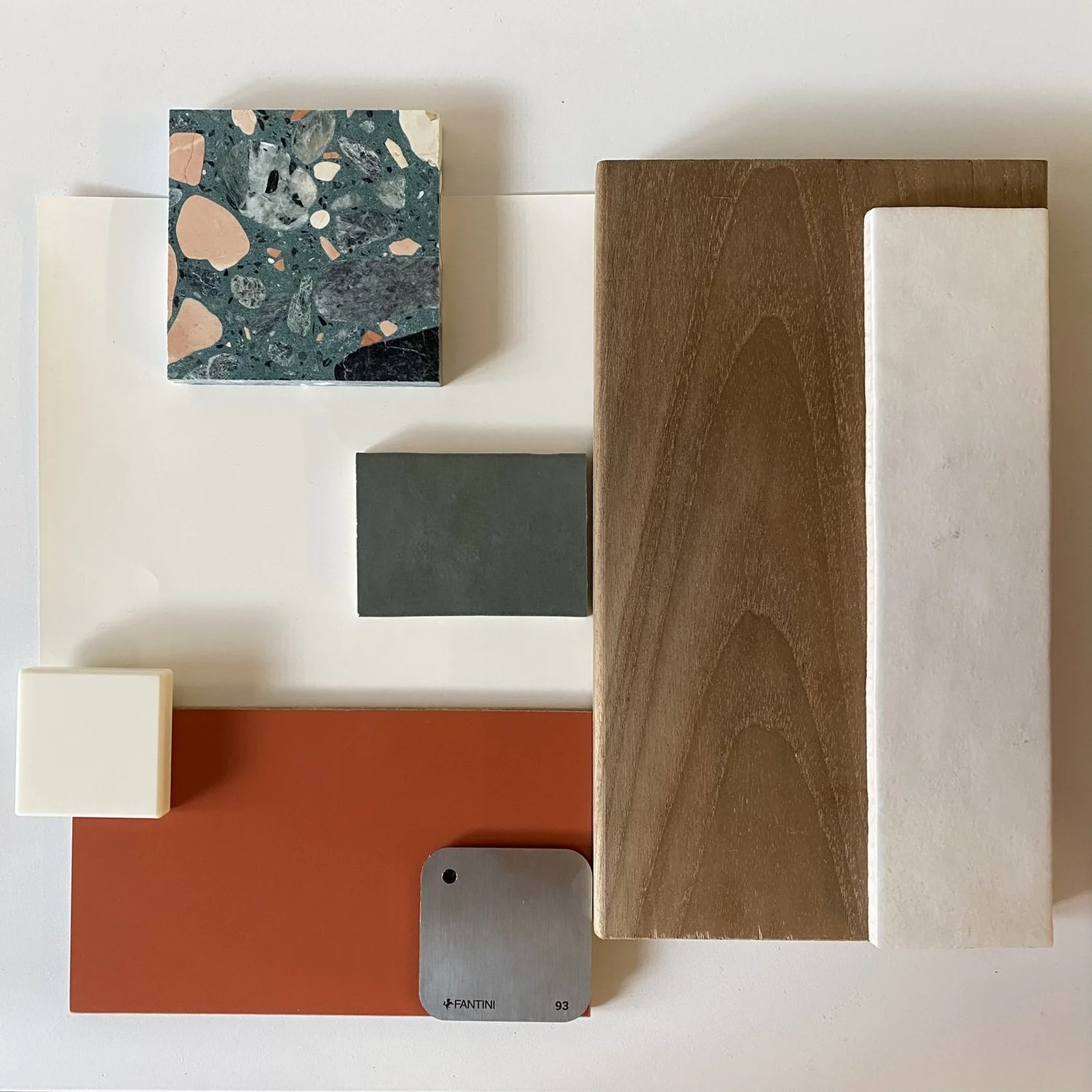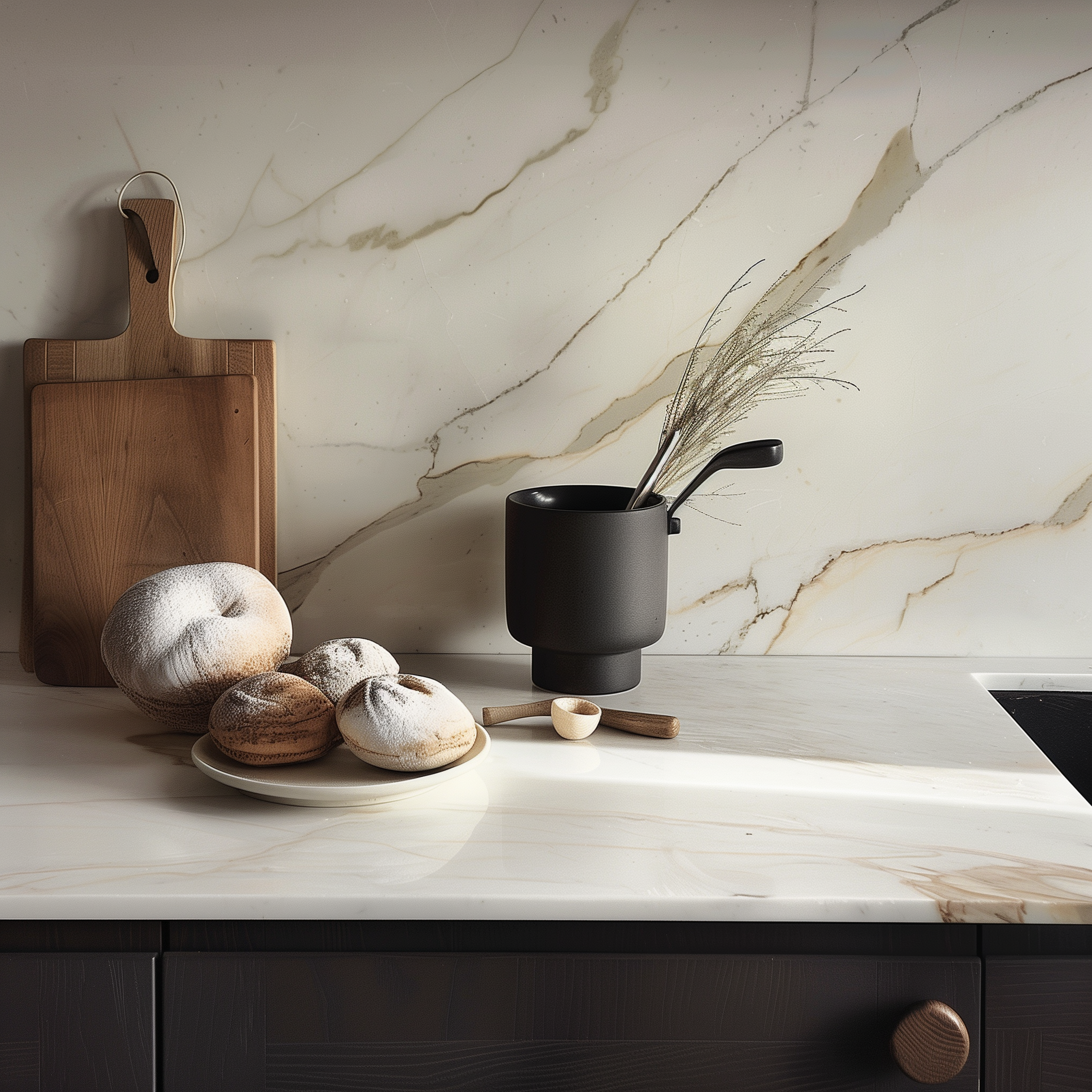What is the best countertop material for my kitchen? Expert Advice
When it comes to kitchen countertops, the choices seem endless. Selecting the perfect material for your countertops is a crucial decision that can significantly impact both the aesthetics and functionality of your kitchen. To help you navigate through the sea of options, we're here to shed light on the pros and cons of some popular countertop materials, ensuring you make an informed decision that suits your needs. So, let's roll up our sleeves and dive right into the world of countertop materials! Listed prices are typical ranges for material cost only.
This article covers engineered stone, agglomerate marble, marble, laminate, soapstone, sintered stone, and wood.
Andrew Mikhael is an architect, interior designer, and President of the National Kitchen and Bath Association’s Olympic West Sound Chapter.
Engineered Stone (Quartz and others)($60-130+/sf):
There’s an engineered stone option for just about any aesthetic. It spans the spectrum of -mostly muted- solid colors, naturalistic patterns, and speckly in betweens. Like Corian, some brands offer integrated sink solutions for a near seamless kitchen or bathroom aesthetic. Some makers also make flooring and shower trays of the same material if you want to get very matchy. The patterns made to look like stone are getting harder to discern from the real thing. Textured options play nicely in designs outside the kitchen, where you may need a countertop but don’t want it to feel “kitchenny”.
Ideal for: With the range of styles, engineered stone can work for just about any situation where you want a reliable, attractive, and low maintenance countertop; from luxury home to investment property.
Pros:
Durability: Engineered stone countertops are composed of a blend of natural quartz crystals and resin binders. This combination creates a highly durable surface that is resistant to scratches, stains, and impact, making it suitable for busy kitchens.
Consistency: Unlike natural stone, engineered stone countertops have a consistent color and pattern throughout the slab. This allows for a more uniform appearance and simplifies the selection process.
Low Maintenance: Engineered stone countertops are non-porous, which means they do not require sealing like natural stone countertops. They are resistant to stains and bacteria growth, making them easy to clean and maintain with regular soap and water.
Wide Range of Colors and Patterns: Engineered stone countertops come in a vast array of colors, patterns, and finishes, allowing homeowners to find the perfect fit for their design preferences and kitchen aesthetic.
Heat Resistance: Engineered stone countertops exhibit excellent heat resistance, enabling you to place hot pots and pans directly on the surface without causing damage. However, it's still advisable to use trivets or heat pads for prolonged exposure to high heat.
Cons:
Price: Engineered stone countertops tend to be more expensive than some other materials such as laminate or tile. The price can vary based on factors such as the brand, color, and thickness of the slab.
Vulnerability to Heat Damage: While engineered stone is heat resistant, extreme temperature changes can cause the material to crack or discolor. It's essential to use protective measures like trivets or heat pads to maintain the longevity and appearance of the countertop.
Not Completely Natural: Although engineered stone contains natural quartz, it is still a man-made product. Some homeowners may prefer the unique variations and character found in natural stone countertops.
Agglomerate Marble ($31-75+/sf)
Imagine a terrazzo countertop without the terrazzo labor. Agglomerate marble is a mixture of marble chips leftover from quarrying that are bound and suspended within a resin. It is a bold and sometimes 70’s retro option with a range of color ways and textures. I am partial to some textures that are honed with a subtle and random undulation.
Ideal for: Bold statement kitchens and baths. You’ve got personality and you’re not afraid to go big.
Pros:
Cost-Effective: Agglomerate stone countertops are generally more affordable compared to natural stone options like granite or marble. They offer a budget-friendly alternative while still providing the look and feel of natural stone.
Sustainable: Recycling leftover marble chips creates a new product out of what could have been waste.
Consistency: Similar to engineered stone, agglomerate stone countertops offer a consistent color pattern throughout the slab. This makes it easier to match and coordinate with other design elements in your kitchen.
Durability: Agglomerate stone countertops are highly durable and resistant to scratches, stains, and heat. They are engineered to withstand heavy use, making them suitable for busy kitchens.
Easy Maintenance: Like engineered stone, agglomerate stone is non-porous and requires minimal maintenance. It is resistant to stains, bacterial growth, and is easy to clean with regular soap and water.
Cons:
Vulnerability to Heat Damage: Although agglomerate stone is heat resistant, extreme temperature changes can cause the material to crack or discolor. Using heat-resistant pads or trivets is recommended to protect the surface.
Susceptibility to Chemicals: Agglomerate stone countertops can be sensitive to harsh chemicals and abrasive cleaners. It's important to follow the manufacturer's guidelines for cleaning and avoid using products that may damage the surface.
Sourcing: Can be difficult to source and get in reasonable quantities, especially from Italy to USA.
Marble ($40-100+):
Marble is a timeless choice that can work for both contemporary and classic aesthetics. A honed marble brings warmth and quiet luxury, while a polished marble finish can dazzle and sparkle.
Ideal for: Classic and serene, marble countertops work great in traditional and restrained minimalist kitchens. And of course, bakers love them.
Pros:
Classic Beauty: Marble countertops exude elegance and sophistication, creating a luxurious atmosphere in your kitchen.
Heat Resistance: Marble is naturally heat-resistant, making it an ideal surface for baking enthusiasts.
Timeless Appeal: With its unique veining and patterns, marble creates a one-of-a-kind look that stands the test of time.
Cons:
Prone to Staining: Marble is porous and susceptible to staining, especially from acidic substances like lemon juice or wine. Regular sealing is necessary.
High Maintenance: Marble requires diligent care and regular sealing to maintain its beauty and prevent etching from acidic spills.
Laminate ($19-45/sf):
The current offerings are of higher quality than the Formica of the 1980’s. If you’re looking for a bright and bold pop of solid color, laminate has options for you. They come in a wide range of solid colors, textures, abstract and faux material patterns. There’s even some manufacturers offering gradient color laminates, a very interesting and unique look that is bound to be right for a particular design.
Ideal for: Bringing back the classic with a new twist. You are looking for a color countertop that is easy to clean, low maintenance, and low cost.
Pros:
Affordability: Laminate countertops are a budget-friendly option, making them an excellent choice for those seeking cost-effective solutions.
Easy Installation: Laminate countertops are relatively easy to install, saving you time and money on professional installation.
Wide Range of Designs: Laminate offers an extensive selection of colors and patterns, including realistic stone and wood finishes.
Cons:
“No cutting your lemon straight on this countertop! ”
Vulnerable to Scratches and Heat: Laminate is more prone to scratches and heat damage compared to other materials. Using cutting boards and trivets is recommended. No cutting your lemon straight on this countertop!
Limited Lifespan: While laminate is durable, it may not last as long as other materials, and it can be more challenging to repair if damaged.
Soapstone ($29-85/sf):
Soapstone is really a special and underused countertop option. It has a feel that compares to marble, albeit only in dark colors. When a design is leaning dark and natural, I break out the soapstone samples. If you are near one of their locations in NY, NJ, CA, or FL, I recommend M.Teixeira. They’ve provided materials and installed soapstone counters in my projects.
Ideal for: A more casual natural stone compared to marble. You love tailored but comfortable clothing for your daily drivers.
Pros:
Natural Beauty: Soapstone countertops showcase a unique and rustic charm with their smooth matte finish and subtle veining. It has a wonderful touch that feels soft and warm.
Heat Resistance: Soapstone is highly heat resistant, making it ideal for hot pots and pans without the risk of damage.
Durability: This dense and non-porous material is resistant to stains, scratches, and bacteria growth.
Easy to Cut: Soapstone is one of the few countertop materials that can be cut with a circular saw, making it a luxurious DIY friendly option.
Cons:
Requires Regular Maintenance: Soapstone countertops require regular oiling to maintain their dark luster and to hide any scratches or blemishes. It will look quite different when oiled or not oiled.
Limited Color Options: Soapstone typically comes in shades of gray, black, or green, which may not suit everyone's aesthetic preferences.
Solid Surface / Corian ($36-100/sf):
Corian is one of my most used countertops. When you want a solid color countertop that is resilient and low maintenance, it fits the bill. I love how when you join two pieces together, you cannot find the seam because it all becomes one; truly seamless.
Ideal for: Color blocking enthusiasts, you want an easy to clean, hygienic countertop that blends in to the big picture without stealing the show.
Pros:
Seamless Appearance: This is a great feature if your countertop is wrapping around a column or has an unusual layout. Corian countertops can be seamlessly integrated, creating a smooth and continuous surface without visible joints or seams.This goes for their solid colors; speckly patterns are easier to spot a seam.
Easy to Clean: The non-porous nature of Corian makes it resistant to stains and easy to clean with mild soap and water.
Design Flexibility: Corian offers a wide range of color options and can be custom-shaped to fit your unique design requirements.
Cons:
Susceptible to Scratches: While Corian is generally durable, it is more prone to scratches compared to some other materials. Using cutting boards and trivets is recommended. I have seen some staining and clouding, but most clients have been very happy even after long use.
Vulnerable to Heat Damage: High heat can cause Corian to discolor or even crack, so using heat-resistant pads or trivets is necessary.
Wood ($14-50+/sf):
Popular with both the DIY and luxury markets because of its ease of use, range, and warmth. Wood countertops can make a pleasing feature in part of a kitchen if you want to mix materials.
Ideal for: Bringing warmth and softness into the kitchen, you want the kitchen to feel like a natural progression from living areas in the house.
Pros:
Natural Warmth: Wood countertops bring a warm and inviting atmosphere to the kitchen, adding a touch of natural beauty.
Versatility: Wood offers endless possibilities in terms of design, with various wood species and finishes available to suit different styles.
Great for Food Preparation: Wood is a forgiving surface for cutting and chopping, reducing wear on knives.
Cons:
Maintenance Intensive: Wood countertops require regular sealing and maintenance to prevent staining, warping, and bacterial growth.
Vulnerability to Water Damage: Wood is sensitive to moisture, so it's crucial to wipe up spills promptly and avoid prolonged exposure to standing water.
Sintered Stone ($20-50+/sf):
A specialized engineered stone that is gaining popularity, sintered stone has a lot to offer.
Ideal for: You want to enjoy your home with the least upkeep. Outdoor kitchen enthusiasts, inside/outside kitchens with ultra low maintenance stone-like counters.
Pros:
Durability: Highly durable; withstanding heat, scratches, staining, thermal shock (temperature drops/rises), and UV ray damage.
Inside/Outside: Considering an outdoor kitchen? Sintered stone is waterproof and weatherproof.
Easy to clean: Won’t react to chemicals.
Lightweight: Easier to install large pieces.
Cons:
Fragility: It can chip or crack easily during processing and cutting. It cannot be polished and repair is difficult. NOT a DIY material.
Simple shapes only: Keep it rectangular.







